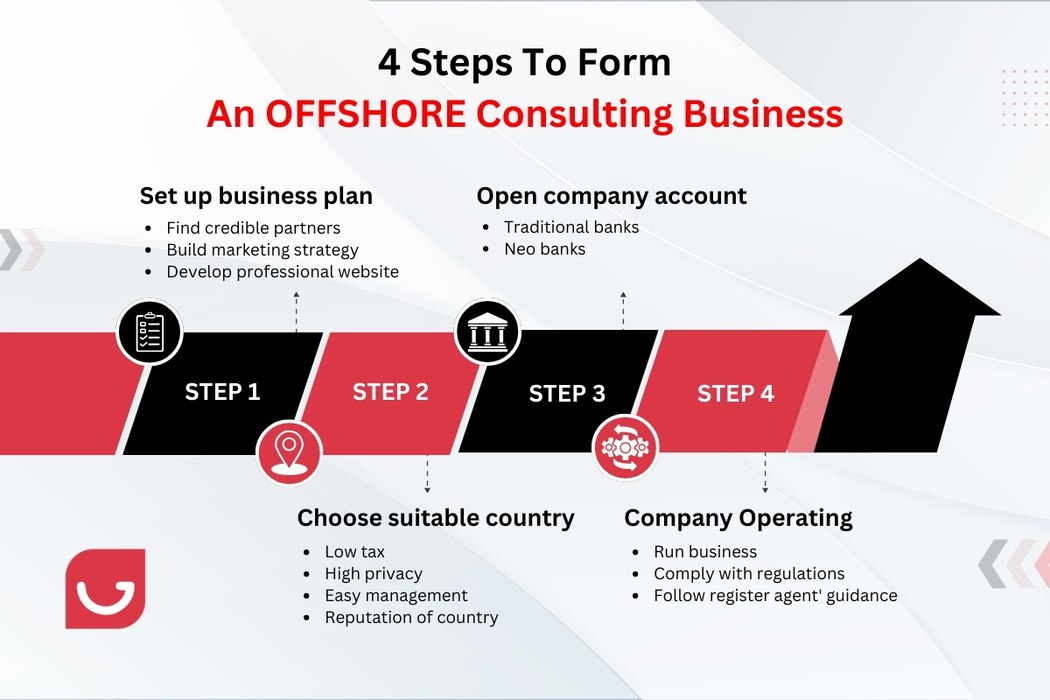How Offshore Company Formations Help Investors Enhance Worldwide Operations
Recognizing Offshore Firm Formations: A Comprehensive Guide to the Process and Benefits
Offshore firm formations provide a tactical avenue for entrepreneurs seeking to optimize their company operations. These entities often supply benefits such as tax obligation benefits, boosted personal privacy, and robust property protection. Nonetheless, comprehending the complexities of selecting a territory, the development procedure, and conformity demands is crucial. As the landscape of worldwide business progresses, the ramifications of establishing an overseas business warrant mindful factor to consider. What steps should one require to browse this facility terrain?
What Is an Offshore Firm?
An overseas company is a service entity incorporated outside the jurisdiction of its owners' residence, usually in a country with positive governing and tax obligation settings. These companies can serve different objectives, consisting of asset security, global trading, and wealth management. They are normally established in jurisdictions called tax obligation sanctuaries, where business tax rates are nonexistent or low, and privacy legislations are stringent.
Offshore business may be had by individuals or various other company entities and can operate in numerous fields, including shopping, money, and consulting. While they offer certain benefits, the governing and lawful frameworks regulating offshore business vary significantly by territory. Local business owner have to navigate these complexities to assure conformity with both global and regional laws. Understanding the framework and feature of offshore firms is vital for individuals considering this alternative for organization operations or possession management.
Advantages of Developing an Offshore Company
While the choice to develop an offshore firm might originate from various strategic considerations, the prospective advantages are engaging for many service proprietors. One considerable benefit is tax obligation optimization; lots of overseas jurisdictions use positive tax obligation prices and even tax exemptions, permitting companies to preserve more revenues. Additionally, overseas companies typically give improved privacy defense, shielding the identities of investors and supervisors from public examination.

Last but not least, company owner may locate operational adaptability, as offshore jurisdictions frequently have less regulatory difficulties, allowing structured management and administration. Jointly, these advantages make overseas business formations an attractive option for numerous seeking to increase their service perspectives.
Picking the Right Jurisdiction
Selecting the ideal territory for an overseas company is an essential step in making best use of the advantages laid out previously. Different factors influence this decision, consisting of tax guidelines, company laws, and the overall service setting. Territories such as the British Virgin Islands, Cayman Islands, and Singapore are typically preferred for their favorable tax programs and durable lawful structures.
It is very important to consider the specific needs of business, such as personal privacy demands and governing compliance. Additionally, the convenience of operating, consisting of the effectiveness of business registration and financial centers, plays a significant role.
Possible proprietors must likewise assess the political stability and track record of the selected jurisdiction, as these aspects can influence long-term success. Eventually, detailed research and specialist consultation are suggested to ensure positioning with the company's objectives and to leverage the complete potential of overseas advantages.

The Offshore Company Formation Refine
The overseas company development process includes a collection of vital steps that call for mindful planning and execution. Initially, individuals or organizations have to select an ideal territory that aligns with their goals, considering aspects such as tax benefits, privacy, and regulative setting. Following this, the following action entails selecting the proper service structure, such as an International Company Business (IBC) or Limited Liability Firm (LLC)
As soon as the framework is identified, required documents, including a company plan, recognition, and evidence of address, need to be prepared. Involving a trustworthy local representative or company can simplify this stage, making certain conformity with local policies. After submitting the required documentation to the relevant authorities, the development process usually finishes in the issuance of a certification of incorporation. This paper develops the company as a lawful entity, permitting it to perform company internationally.
Legal Demands and Compliance
Understanding the legal needs and conformity obligations is essential for anybody wanting to develop an offshore company. Each territory has specific policies that have to be abided by, which can include firm registration, getting needed licenses, and maintaining neighborhood addresses. Offshore Company Formations. It is important to assign a registered representative who can facilitate communication with local authorities and assurance compliance with continuous reporting requirements
In addition, lots of territories require the submission of yearly financial declarations, together with tax obligation filings, even if the business does not create income. Supervisors and investors have to be identified, with due diligence procedures typically mandated to verify their identities. Failing to meet these lawful responsibilities can result in fines or the dissolution of find out here now the firm. As a result, possible overseas business proprietors should speak with attorneys experienced in global service regulation to navigate these complexities properly and assure full compliance with all regulations.
Tax Implications of Offshore Companies
The tax ramifications of overseas business existing substantial benefits that bring in lots of entrepreneurs. Understanding the connected compliance demands is essential for maneuvering the complexities of worldwide tax legislations. This section will check out both the prospective benefits and the required obligations connected to overseas organization frameworks.
Tax Obligation Benefits Review
Offshore firms are often viewed with suspicion, they can offer substantial tax obligation advantages for individuals and organizations looking for to enhance their financial strategies. Among the main benefits is the possibility for lower company tax obligation rates, which can lead to significant cost savings. Many overseas jurisdictions offer favorable tax obligation programs, including zero or minimal tax on profits, capital gains, and inheritance. Additionally, overseas firms can promote worldwide service operations by decreasing tax obligations related to cross-border deals. This structure might also make it possible for tax deferral opportunities, permitting revenues to grow without instant tax. Inevitably, these advantages add to improved economic efficiency and possession protection, making offshore firms an appealing option for wise investors and business owners.
Compliance Demands Discussed
Offshore companies might offer tax obligation advantages, but they also include a collection of conformity requirements that have to be thoroughly browsed. These entities are subject to details reporting obligations, which vary considerably depending upon the jurisdiction. Generally, overseas companies need to maintain exact financial records and send annual economic statements to abide by local laws. In addition, many territories call for the disclosure of advantageous ownership to deal with cash laundering and tax evasion. Failing to stick to these conformity actions can cause extreme fines, consisting of penalties and possible loss of service licenses. Recognizing the neighborhood tax obligation legislations and global contracts is essential, as they can impact tax liabilities and overall operational legality. Engaging with economic and lawful professionals is a good idea to ensure full compliance.
Keeping and Handling Your Offshore Business
Maintaining and managing an offshore firm entails sticking to different continuous compliance requirements necessary for legal operation. This consists of attentive economic document keeping and an understanding of tax obligations important to the company's territory. Efficient management not just assures regulative compliance yet additionally supports the company's economic health and wellness and longevity.
Recurring Conformity Requirements
Ensuring recurring compliance is essential for any type of entity operating in the overseas industry, as failing to satisfy regulatory demands can bring about considerable fines or even dissolution of the firm. Offshore business have to adhere to neighborhood laws, which might consist of annual declaring of financial declarations, payment of needed fees, and preserving a registered workplace address. Furthermore, companies are typically needed to designate a local representative or rep to promote interaction with authorities. browse this site Normal updates on modifications in regulations or tax requirements are important for compliance. Adherence to anti-money laundering (AML) and know-your-customer (KYC) regulations is crucial. By keeping arranged records and staying notified, offshore business can assure they stay compliant and minimize dangers related to non-compliance.
Financial Record Keeping
Reliable financial record keeping is essential for the successful monitoring of any kind of overseas company. Maintaining precise and in-depth financial records aids in tracking the company's efficiency, assuring conformity with neighborhood laws, and facilitating informed decision-making. Companies should execute methodical processes for documenting revenue, expenses, and purchases to develop openness and responsibility. Using accountancy software program can enhance this process, enabling real-time financial analysis and coverage. On a regular basis examining monetary statements aids recognize patterns, evaluate success, and manage cash money circulation successfully. It is crucial to safely keep these documents to safeguard sensitive info and assurance simple access during audits or economic evaluations. By prioritizing thorough monetary document keeping, overseas business can boost operational performance and support lasting success.
Tax Commitments Introduction
Understanding tax visit this website obligation obligations is crucial for the appropriate management of an overseas company, as it straight affects financial performance and compliance. Offshore firms may undergo various tax obligation regulations depending on their territory, consisting of business tax obligations, value-added taxes, and withholding taxes. It is imperative for company owner to remain informed regarding their tax obligation obligations, as failing to conform can lead to fines and lawful issues. In addition, many offshore jurisdictions supply tax rewards, which can substantially benefit companies if browsed appropriately. Involving a well-informed tax consultant or accounting professional specializing in international tax law can assist assure that firms meet their responsibilities while maximizing their tax techniques. Eventually, diligent tax monitoring adds to the overall success and sustainability of an overseas entity.
Frequently Asked Concerns
Can I Open a Savings Account for My Offshore Firm From Another Location?
The ability to open a financial institution account for an offshore business from another location depends on the bank's plans and the jurisdiction's policies. Numerous banks supply remote solutions, yet details needs might vary significantly between organizations.
What Are the Expenses Included in Developing an Offshore Business?
The prices associated with developing an overseas business usually include registration fees, lawful and consulting expenditures, and recurring maintenance charges. These expenses differ substantially based upon jurisdiction, complexity of the business framework, and details solutions needed.
Exist Limitations on Who Can Be an Investor?
Limitations on investors vary by jurisdiction. Some nations might enforce constraints based upon organization, citizenship, or residency kind - Offshore Company Formations. It's important for possible investors to study particular regulations relevant to their chosen offshore place
Exactly how Lengthy Does the Offshore Company Development Refine Typically Take?
The overseas company formation procedure typically takes between a couple of days to several weeks. Elements affecting the timeline consist of jurisdiction demands, record preparation, and responsiveness of appropriate authorities entailed in the registration procedure.
What Happens if I Fail to Follow Local Laws?
Failure to adhere to regional laws can lead to extreme fines, consisting of penalties, lawsuit, or loss of business licenses - Offshore Company Formations. It may also damage the company's reputation and impede future organization possibilities in the territory
An overseas firm is a company entity incorporated outside the jurisdiction of its owners' residence, commonly in a nation with desirable regulatory and tax atmospheres. One considerable benefit is tax obligation optimization; several offshore jurisdictions provide beneficial tax rates or even tax obligation exceptions, permitting companies to keep more profits. Offshore companies are typically checked out with apprehension, they can offer substantial tax obligation advantages for people and services seeking to optimize their monetary methods. Additionally, offshore firms can assist in worldwide business procedures by minimizing tax responsibilities connected with cross-border transactions. Offshore firms might be subject to various tax obligation legislations depending on their jurisdiction, consisting of corporate tax obligations, value-added taxes, and withholding taxes.